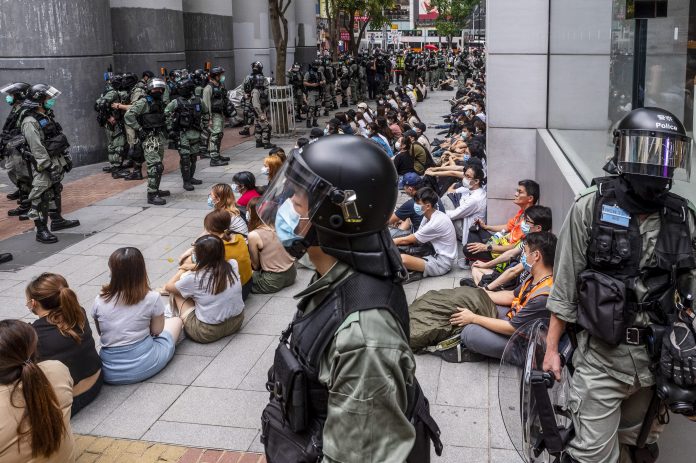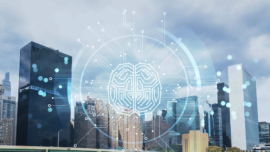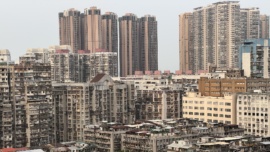Future (the) – When one talks about Hong Kong’s future they are not referring to 2021 or 2025, but 2047. So there is a lot of time before then. And if six months ago very few people could anticipate that a couple of months later Beijing would pass a sweeping national security bill that would change the Region, speaking in the long term may seem unwise.
MB September 2020 Special Report | Understanding Hong Kong – A to Z

Therefore, there is a certain amount of speculation when approaching this issue.
Discussing Hong Kong’s future is a rather polarizing matter. Are we on the verge of the demise of the HKSAR as an international financial hub with a world-class legal system or is this a “new beginning” paving the way for a still cosmopolitan prosperous city that can greatly benefit from closer integration with the mainland?
Those who anticipate that for many of the inhabitants of Hong Kong the future will pass through emigration base their forecast on several assumptions.
First, Hong Kong can be seen as particularly geared towards leaving the city, given the sizable population of dual passport holders with family members or relatives living abroad.
This has been shown in surveys. A 2019 study carried by the Chinese University of Hong Kong indicated that one in three Hong Kong residents would emigrate if they could.
In recent months, there have been more signs of a potential emigration wave.
On the one hand, thousands of Hong Kong citizens have applied for foreign immigration documents; immigration consultants in Hong Kong report that caseloads have doubled since the legislation’s proposal”, according to a news feature from Fortune magazine. On the other hand, several nations have made moves to expedite the immigration process and/or grant refugee status to many of those emigrants, including Australia, Canada, Taiwan, the United Kingdom, and the United States. London has announced that a program aimed paving the way for UK citizenship will accept a maximum total of 3 million eligible British National Overseas (BNO) holders.
Another report, from the German channel DW, stated that “some 50,000 people emigrated in the last two quarters of 2019, a time of protests and escalating violence. In December, 20,000 people applied to the Hong Kong police for a Certificate of No Criminal Conviction, which is a mandatory document for anybody hoping to emigrate. This was a 60 percent increase over the same period in the previous year.”
Since for many people emigrating is not an option, even if they long for it, Hong Kong-based scholar Simon Shen states that “in the era of the digital revolution, the new ‘Hong Kong’ may not be confined to a singular geographical location”, arguing that the new “identity can serve as a force attracting all Hongkongers in the world to build a virtual city whose citizens have no geographic barriers and are able to pursue any livelihood they desire”.
A very different view is espoused by those who regard the national security law as a crucial instrument to bring much-needed stability and prosperity for the city’s future.
For instance, Hong Kong magnate Allan Zeman stresses that Hong Kong’s future lies in the Guangdong-Hong Kong-Macau Greater Bay Area, which, with its enormous markets and numerous business opportunities, will offer Hong Kong a broader space to develop. “Hong Kong is only going to get better”, Zeman said in an interview with Xinhua, “I feel very strongly about it, and I have nothing to fear.”
In the same thread, Hong Kong-based author Nury Vittachi penned an article published by China Daily called “No, once again, it’s not the death of HK”, arguing that over the past four decades doomsayers who keep on anticipating the “death of Hong Kong” have been wrong every single time. “We all know China can be unpredictable. But honest journalists acknowledge its record in Hong Kong has been better than predicted”, Vitacchi wrote.
A bolder statement was made by deputy director of the Hong Kong and Macao Affairs Office Zhang Xiaoming. He argued that the national security law would boost the ‘one country, two systems’ principle, and ensure freedoms beyond 2047.

Gang of four – The expression was first used to describe Mao’s wife, Jiang Qing, and three other figures that came to power during the period known as the Cultural Revolution. “The Gang of Four conspired to usurp the party and seize power,” the People’s Daily said in November 1976.).Mainland Chinese state media have used the expression in other occasions since then and with regards top Hong Kong it happened at least twice.
The first time it happened in 2013: several state media editorials have used the ‘infamous label former chief secretary Anson Chan, Bishop Emeritus Joseph Zen, Apple Daily publisher Jimmy Lai and Democratic Party founder Martin Lee to the group.
Last year, following the problems caused by the announcement of the extradition bill, the catch phrase came out again, now to designate the same three, plus the former Democratic Party chief Albert Ho, who replaces the old Cardinal. The four are marked due to their alleged collusion with foreign forces in relation to the 2019 Hong Kong anti-extradition bill protests. People’s Daily newspaper called the four “secretive middlemen and modern traitors.” “Hong Kong’s ‘Gang of Four’ hits back at Beijing,” echoed the Financial Times.
Of the four, Jimmy Lai is the main target. According to China’s state media, he is a “traitor”, the biggest “black hand” behind last year’s rallies, namely the violent ones, and the head of a new “Gang of Four” conspiring with foreign nations to undermine the motherland. Jimmy Lai is seen as one of the leading voices asking for foreign interference. In July 2019, he met with US Vice President Mike Pence and Secretary of State Mike Pompeo amid the protests.
Lai was arrested in August for alleged collusion with foreign forces (a crime under the new national security law) as well as fraud and released on bail 40 hours later. The detention was reportedly part of an investigation into an online group that canvassed foreign countries to sanction Hong Kong.
“Fortunately, I was not sent to Mainland ” he said.
In the likely scenario of Chinese state media updating the list, in light of last months’ events, names like Nathan Law and Joshua Wong, linked to the now defunct localist party Demosisto and the face of the 2014 Umbrella Movement, are in the front line. Law has left Hong Kong as the national security law was coming into effect and has been campaigning for further sanctions against Hong Kong and Mainland Chinese officials as well as lobbying Western leaders . An arrest warrant has meanwhile been issued against him by Hong Kong police.
Edward Leung Tin-kei, the pro-independence activist who has been in jail since 2018 on rioting charges for his involvement in the 2016 Mong Kok unrest which left 90 police officers injured, is sometimes regarded as the new “spiritual leader” of the radical separatist movement.
Activist Brian Leung Kai-ping, who like Law testified via videoconference before the United States Congress’ House Foreign Affairs Committee, is another name.
Less likely are the other co-founder of the 2019 protests, sociologist Chan Kin-man, sentenced to 16 months in jail, Labor Party founder Lee Cheuk-yan or reverend Chu Yiu-ming, 75 (he was given a suspended sentence considering his poor health).

Hong Kong and Macau Affairs Office (HKMAO) – The HKMAO is an administrative agency of the State Council of the People’s Republic of China “responsible for promoting cooperation and coordination of political, economic and cultural ties between Mainland China and the Chinese Special Administrative Regions of Hong Kong and Macau.”
According to the Article 22 of the Basic Law, “no department of the Central People’s Government and no province, autonomous region, or municipality directly under the Central Government may interfere in the affairs which the Hong Kong Special Administrative Region administers on its own in accordance with this Law.”
Last April 13, a controversy broke out over what Hong Kong’s Basic Law says about the central government’s Liaison Office and Hong Kong and Macau Affairs Office, and whether they can interfere in Hong Kong’s local affairs. The controversy kicked off when the Liaison Office and HKMAO both released statements blaming pan-democrats’ delay tactics for stopping the Legislative Council from dealing with bills. Opposition legislators accused the Offices of violating the Basic Law, but a spokesman for the HKMAO said it is “inaccurate” to say the Liaison Office is bound by article 22 of the Basic Law.
This new role for HKMAO coincides with the arrival in February of Xia Baolong, the 67-year-old Vice-Chairman of the Chinese People’s Political Consultative Conference, considered close to Xi Jinping. However, Zhang Xiaoming, relegated to Deputy Director, is still playing a leading role.
Since April 13, the local HKMAO office has been active in the mass media by issuing statements on a regular basis.
The main interventions in defense of the new National Security Bill came from the HKMAO, which labelled the ‘Pan-Democratic’ primary elections “an illegal manipulation in the Legislative Council.”

Identity – Opinion studies, carried out at least since the 1980s, show what is commonly called an identity crisis in Hong Kong: part of the population called itself Chinese and the other Hongkongers – contrary to what is happens in Macau, where the overwhelming majority of the population feels Chinese.
As the Chinese presence (economic, social, cultural and political) was asserting itself, the division increased, as if being Hongkonger or being Chinese had ceased to be complementary to become increasingly exclusive statutes. Brian C.H. Fong, a political scientist at the Education University of Hong Kong, has dated this change to 2009, “when Beijing began a campaign to cultivate Chinese identity here, as part of its effort to reintegrate the territory.”
And that’s why Mr. Fong wrote a book called “One Country, Two Nationalisms: Center-Periphery Relations between Mainland China and Hong Kong, 1997–2016.”
It turns out that, especially since 2014, this ethnic “balance” has been disappearing and the events of last year definitely accentuate the appearance of what some experts call “a new, uniquely Hong Kong-based identity.”
“Almost nobody in Hong Kong under 30 identifies as ‘Chinese’,” was the title of an Economist work, published in 2019, which portrays the essentials of this ‘new identity’: it is mainly the young people who most refuse the relationship with China, and they do it in a combative way. It is in this context that the localist movement was born, which defends the complete autonomy of Hong Kong. “Ironically, instead of successfully assimilating Hongkongese into one Chinese nation, Beijing’s incorporation strategies are leading to a rise of peripheral nationalism in the city-state and waves of counter-mobilization,” wrote Professor Fong.
A recent online survey (890 Hong Kong citizens, between June 22 and 26, right before the passage of the National Security Law) shows that over three-quarters of the sample identified as Hong Konger, an affiliation more likely to be held among the young. “Our sample’s proportion of Chinese-identifying individuals mirrors the share of those who affiliated with a pro-Chinese establishment political party; the same is the case for the comparable proportion of those who identify as Hong Konger to those identified with a non-establishment movement (pan-democrat, localist, or self-determinist),” according to a Foreign Policy report.

Journalism – There are days of uncertainty and angst in the Hong Kong journalist community, according to a survey carried out by the Hong Kong Journalists Association; in which 98 per cent of the 150 respondents said they were against the legislation, with an overwhelming majority also expressing concerns over its potential impact on press freedom.
In the eyes of former Washington Post correspondent in Hong Kong, Keith Richburg, “There are certain ways that we can write about things without the government’s ire falling on us, making readers realize what we’re talking about. This is a new reality and we have to find ways to navigate around it.”
When the public broadcaster RTHK rendered, “Liberate Hong Kong” as “L ******* # HongKong” in a tweet, one can think that a lot of people are looking for those new red lines.
It is too early to understand whether the first reactions to the new law, such as the end of the colourful “Lennon walls” with pro-protesters messages, or the removal of books that might “endanger” national security, while public libraries have pulled sensitive books, are to consolidate. But it seems certain that all of this will lead to an increase in self-censorship. “What constitutes subversion to the government is always very vague. If there is a Chinese state-owned company on the Hong Kong stock market and a journalist reports about its accounting fraud, that can potentially become a subversive act, according to the law,” said US-based scholar Ho-fung Hung, from Johns Hopkins University.
The arrest of Apple Daily boss Jimmy Lai and the police raid of the newspaper’s offices and newsroom led to strongly worded condemnation by journalist groups that sounded the alarm of the “chilling effect” of the operation. South China Morning Post reported that Hong Kong police have adopted a new system under which only journalists from “trusted media outlets” are allowed to report from inside the force’s cordoned off areas, something that also drew a backlash from press groups. Other concerns were raised by the Foreign Correspondents’’ Club (FCC) over “
In light of these developments, a number of commentators stated press freedom was under assault, with some going as far as saying it was dying. Other analysts dispute such assertion. Hong Kong-based journalist and author Nuri Vitacchi argues that “the arrest of Jimmy Lai and raid on his office do not affect press freedom”, pointing out that after the police operation Hong Kong media, including Apple Daily, continued to criticize whoever they wanted however they like.
Following another statement from the FCC condemning Jimmy Lai’s arrest, the Office of the Commissioner of Foreign Affairs in Hong Kong issued a statement expressing firm opposition to attempts to “whitewash and justify Jimmy Lai and other criminal suspects”, while calling on the FCC to “respect the facts, distinguish right from wrong, and stop smearing under the pretext of press freedom the implementation of the National Security Law”.
The Government of Hong Kong has sought to ease concerns over the law’s impact on the city’s press freedom. “It is stated in the overview section of the law that, whilst national security has to be safeguarded, human rights will also be respected and defended,” said Carrie Lam. And Chief Secretary Matthew Cheung Kin-chung added, “To those law-aiding people and journalists, when they are exercising these rights, as long as they don’t run afoul of the law… to endanger state security, they don’t need to worry.”
Special Report | Understanding Hong Kong – A to Z > See here A-E
























